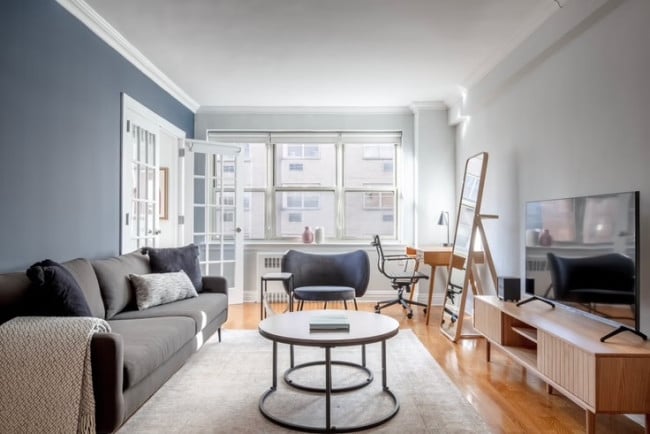Moving to NYC for an internship and need short-term rental? Here’s Brick Underground’s best advice

Congrats on your internship! Now comes the hard part of finding a short-term place to stay. One tip: Let absolutely everyone know you're apartment hunting. Lots of people prefer to sublet to someone they know, or at least a friend of a friend.
iStock
New York City is the epicenter for art, fashion, finance, media, and other industries, so landing an internship here can really boost your resume. But finding a rental here is always a challenge, and it is especially hard to find places for a short-term stay.
You are competing with thousands of students looking for somewhere to live in an already competitive rental market, during the city's busiest moving season. Renting here is already unlike other cities (meaning far more expensive and complicated), so before you start your search, be sure to brush up on the paperwork and finances you need to have ready in order to pounce a on place you like. Check out Brick Underground's "The 8 biggest hurdles for first-time NYC renters, solved."
Read on for our best advice on finding a place to live during your internship. (And congratulations!)
With Blueground, you’ll shave weeks off finding and furnishing your new home. From studios to two-bedroom spaces, each of our turnkey apartments is thoughtfully designed and fully equipped from top to bottom. We provide a hassle-free experience and the flexibility to stay as long as you want — 30 days, a year, or longer. During your stay? You’ll enjoy reliable support through our app, where you can request everything from a home cleaning to extra towels. Check out over 500 unique apartments in Williamsburg, Midtown, and other top NYC areas and compare prices here.
Tap your network
One of the most important ways to find an apartment in NYC is to simply let as many people know that you are looking for a place—you never know if a friend’s aunt has a condo that is available unless you start asking around in person and on your social media networks. And if you don't know anyone in NYC—maybe you have a friend who does.
Some owners prefer to rent to someone they know, or a friend or relative of someone they know, instead of listing a place on the market, especially when they are subletting their primary residence. You’re likely to get a nicer place than the usual rental, so stress that you are very responsible and will take good care of the place. This route can be especially advantageous if you’re looking for a short-term rental for the summer and (for example) a condo owner wants to make some income while they’re at their vacation home.
Widen your search
You may be thinking you’re going to be living it up in Williamsburg for the summer only to find out there are no apartments available there, or at least nothing remotely in your price range. That’s when looking beyond the most popular neighborhoods will be your friend. Check out Brick’s list of the most affordable neighborhoods to rent. The good thing is that a trip on the subway, no matter how long, costs the same $2.75.
Avoid scams when you sublet
You will want to steer clear of illegal sublets—meaning apartments that are not supposed to be sublet for a variety of reasons. Some buildings, typically co-ops, have rules against subletting, and the same goes for landlords, although shareholders and tenants will still try to sublet on the sly. If you're considering a sublet, ask if the apartment owner or leaseholder is truly allowed to sublet, and ask to see where permission is granted in writing. You wouldn't want to be kicked out before your internship ends. For more, read "How to rent a short-term, furnished apartment in NYC without getting scammed."
There are scams galore in NYC, so look at every apartment listing with a critical eye, ask questions, and check out the broker too, because if an apartment seems too good to be true, it probably is. For more tips, check out "Don't fall for any of these real estate scams."
Consider a short-term rental company
If dodging scams sounds like a headache, consider using a short-term rental company, which offer furnished, turn-key apartments. While these may be more expensive, you will get peace of mind and not have to fear being kicked out. For a round up of short-term rental companies read "An insider's guide to finding a short-term, furnished apartment rental in NYC."
Find a roommate
Getting a roommate is a good way to cut costs and share responsibilities. Need help finding one? Brick has you covered with "The 12 best websites for finding a roommate in NYC." Make sure you meet in person, or if you’re moving from another city, schedule a FaceTime meeting, and ask tons of questions. Not sure how to screen potential roommates? Be sure to read "The 21 best questions to ask potential roommates to get the perfect match."
Find a no-fee rental apartment to cut some costs
A no-fee apartment helps you save some cash on your move to NYC. You'll avoid a broker fee with many large rental buildings where you rent directly from management. For more resources, check out "The 8 best websites for finding a no-fee rental apartment" and "How to use Google Maps to find a no-fee apartment."
Give co-living a shot
Co-living is like an upscale, turn-key take on dorm living. These shared apartments are typically furnished, cleaning services and utilities are included, and you are matched with roommates, so you don’t have to find them yourself. They are ideal for internships because lease terms are flexible, and they don't have stringent income requirements or require guarantors like regular landlords. Many offer an instant social life with events and programming so you can make friends during your stay in NYC.
There are lots of co-living companies in NYC, and they each strive to cater to a different niche. To get a sense of what's available, check out "Brick Underground's guide to co-living spaces."
Skeptical about sharing a space with strangers? Brick Underground has talked to several co-living renters about their experience. Check out "What co-living is like: An insider describes his life in an 'adult dorm,'" and "My new co-living life: Paying one price for state-of-the-art amenities and an instant social network." Ready to sign up for a co-living apartment? Be sure to brush up on some of the rules so you don't find yourself on the wrong side of the law. Make sure you are signing a lease for an apartment, not just a room. Read "Understanding the legal issues of co-living: 3 ways to protect yourself."
Some renters at a company called Bedly probably wished they knew what they were getting into—after loads of complaints about service and safety, the company shut down. To make sure you don't find yourself in a similar situation see "How to tell if a co-living company is legit or sketchy: Lessons from Bedly's meltdown."
Take over someone else’s lease
In NYC, renters are always coming and going, even before the end of a lease. That could be an opportunity for you, since you only need a place for a few months. You can find listings on Leasebreak for sublets, rooms in apartments, entire apartments, and furnished spaces.
—Earlier versions of this article contained reporting and writing by Austin Havens-Bowen.
You Might Also Like



























